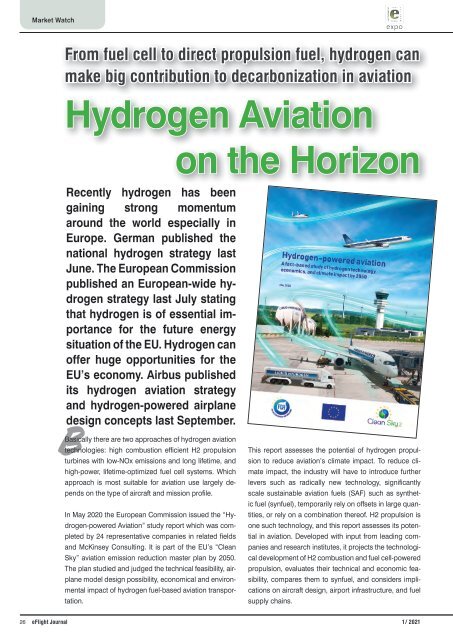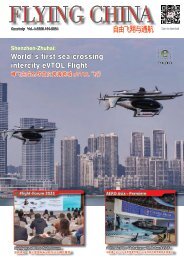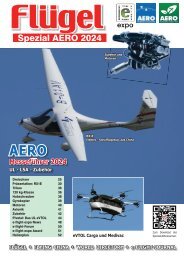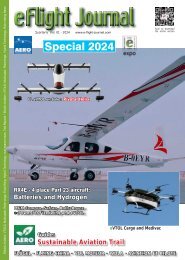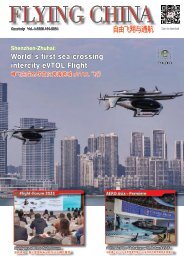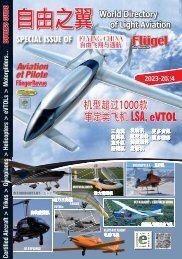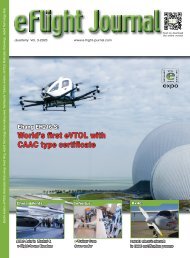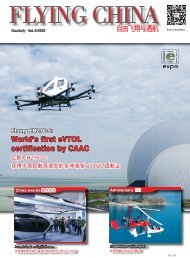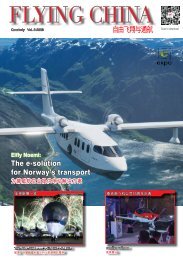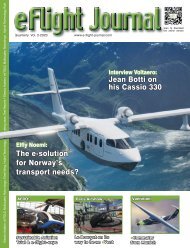eFlightJournal-04-2020+01-2021double issue
E-Flight Journal double issue The Journal for electric aviation, hybrid electrical Aircraft and Evtol from the Publisher Flying Pages
E-Flight Journal double issue
The Journal for electric aviation, hybrid electrical Aircraft and Evtol from the Publisher Flying Pages
Create successful ePaper yourself
Turn your PDF publications into a flip-book with our unique Google optimized e-Paper software.
Cover Market Story Watch<br />
From fuel cell to direct propulsion fuel, hydrogen can<br />
make big contribution to decarbonization in aviation<br />
Hydrogen Aviation<br />
on the Horizon<br />
Recently hydrogen has been<br />
gaining strong momentum<br />
around the world especially in<br />
Europe. German published the<br />
national hydrogen strategy last<br />
June. The European Commission<br />
published an European-wide hydrogen<br />
strategy last July stating<br />
that hydrogen is of essential importance<br />
for the future energy<br />
situation of the EU. Hydrogen can<br />
offer huge opportunities for the<br />
EU’s economy. Airbus published<br />
its hydrogen aviation strategy<br />
and hydrogen-powered airplane<br />
design concepts last September.<br />
BBasically there are two approaches of hydrogen aviation<br />
technologies: high combustion efficient H2 propulsion<br />
turbines with low-NOx emissions and long lifetime, and<br />
high-power, lifetime-optimized fuel cell systems. Which<br />
approach is most suitable for aviation use largely depends<br />
on the type of aircraft and mission profile.<br />
In May 2020 the European Commission <strong>issue</strong>d the “Hydrogen-powered<br />
Aviation” study report which was completed<br />
by 24 representative companies in related fields<br />
and McKinsey Consulting. It is part of the EU’s “Clean<br />
Sky” aviation emission reduction master plan by 2050.<br />
The plan studied and judged the technical feasibility, airplane<br />
model design possibility, economical and environmental<br />
impact of hydrogen fuel-based aviation transportation.<br />
This report assesses the potential of hydrogen propulsion<br />
to reduce aviation’s climate impact. To reduce climate<br />
impact, the industry will have to introduce further<br />
levers such as radically new technology, significantly<br />
scale sustainable aviation fuels (SAF) such as synthetic<br />
fuel (synfuel), temporarily rely on offsets in large quantities,<br />
or rely on a combination thereof. H2 propulsion is<br />
one such technology, and this report assesses its potential<br />
in aviation. Developed with input from leading companies<br />
and research institutes, it projects the technological<br />
development of H2 combustion and fuel cell-powered<br />
propulsion, evaluates their technical and economic feasibility,<br />
compares them to synfuel, and considers implications<br />
on aircraft design, airport infrastructure, and fuel<br />
supply chains.<br />
26<br />
e Flight Journal<br />
1 / 2021


